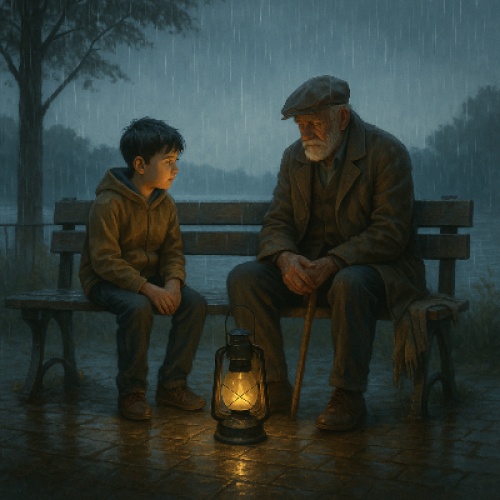It had been raining for thirty straight days in the town of Niralpur
Not the wild, thundering kind of storm - but a soft, steady drizzle that soaked everything, wore down spirits, and made time feel heavy. People stopped hanging out laundry. Children forgot what sunshine looked like. Even the birds seemed to have run out of songs.
Shops closed early. Streets stayed quiet. Umbrellas became useless because everything, everywhere, was wet anyway.
Except for one man.
Old Mr. Keshav.
Every morning, wrapped in his faded brown shawl, he would walk to the far edge of the town near the lake, holding a red lantern and a bunch of white flowers. He sat on the same bench under the same tree, smiling into the grey mist, as if the rain told him stories no one else could hear.
People thought he was a little strange.
But Aru, a twelve-year-old boy with too many questions and not enough answers, couldn't look away.
One day, curiosity won.
Aru followed Mr. Keshav after school, walking carefully along the puddled path. He hid behind a mango tree when he saw the old man place the flowers on the bench and sit silently.
Then, Keshav spoke - though no one else was there.
"I'm here, Meera. Just like I promised."
The boy's heart skipped. He watched as the man took a letter from his pocket, opened it with shaking hands, and read it aloud.
"You always loved the rain. Said it made the world quieter, kinder. I didn't believe you then. But now? now I wait for it. Because it brings you to me."
Aru didn't know what to do. He stepped on a twig.
Keshav turned, saw the boy, and smiled - not surprised.
"Come here, beta," he said gently.
Aru walked forward, unsure and wet.
"Is she? your wife?" he asked softly.
Keshav shook his head. "My daughter. Meera. She died four years ago. She used to dance in the rain like it was made for her."
He paused, looking at the lake. "The day she died, it rained like this. And it hasn't stopped since."
Aru said nothing. He sat beside him, listening to the rhythm of raindrops falling on the leaves.
"But this morning," Keshav continued, "I felt something different. Like? she's ready to say goodbye."
They sat in silence.
The next morning, the rain stopped.
For the first time in a month, the sun rose over Niralpur. The streets steamed gently as the town woke up, confused but grateful.
Children ran outside. Windows opened. Smiles returned.
And at the edge of town, on the now-dry bench, Aru found the red lantern, the last letter, and a note addressed to him:
Thank you for believing in what others couldn't see.
Keep listening. Some things never leave - they just learn to whisper.
- Keshav
Aru looked up. The tree above him rustled in the soft breeze.
And somewhere, faintly, it smelled like white flowers in the sun.
Not the wild, thundering kind of storm - but a soft, steady drizzle that soaked everything, wore down spirits, and made time feel heavy. People stopped hanging out laundry. Children forgot what sunshine looked like. Even the birds seemed to have run out of songs.
Shops closed early. Streets stayed quiet. Umbrellas became useless because everything, everywhere, was wet anyway.
Except for one man.
Old Mr. Keshav.
Every morning, wrapped in his faded brown shawl, he would walk to the far edge of the town near the lake, holding a red lantern and a bunch of white flowers. He sat on the same bench under the same tree, smiling into the grey mist, as if the rain told him stories no one else could hear.
People thought he was a little strange.
But Aru, a twelve-year-old boy with too many questions and not enough answers, couldn't look away.
One day, curiosity won.
Aru followed Mr. Keshav after school, walking carefully along the puddled path. He hid behind a mango tree when he saw the old man place the flowers on the bench and sit silently.
Then, Keshav spoke - though no one else was there.
"I'm here, Meera. Just like I promised."
The boy's heart skipped. He watched as the man took a letter from his pocket, opened it with shaking hands, and read it aloud.
"You always loved the rain. Said it made the world quieter, kinder. I didn't believe you then. But now? now I wait for it. Because it brings you to me."
Aru didn't know what to do. He stepped on a twig.
Keshav turned, saw the boy, and smiled - not surprised.
"Come here, beta," he said gently.
Aru walked forward, unsure and wet.
"Is she? your wife?" he asked softly.
Keshav shook his head. "My daughter. Meera. She died four years ago. She used to dance in the rain like it was made for her."
He paused, looking at the lake. "The day she died, it rained like this. And it hasn't stopped since."
Aru said nothing. He sat beside him, listening to the rhythm of raindrops falling on the leaves.
"But this morning," Keshav continued, "I felt something different. Like? she's ready to say goodbye."
They sat in silence.
The next morning, the rain stopped.
For the first time in a month, the sun rose over Niralpur. The streets steamed gently as the town woke up, confused but grateful.
Children ran outside. Windows opened. Smiles returned.
And at the edge of town, on the now-dry bench, Aru found the red lantern, the last letter, and a note addressed to him:
Thank you for believing in what others couldn't see.
Keep listening. Some things never leave - they just learn to whisper.
- Keshav
Aru looked up. The tree above him rustled in the soft breeze.
And somewhere, faintly, it smelled like white flowers in the sun.





